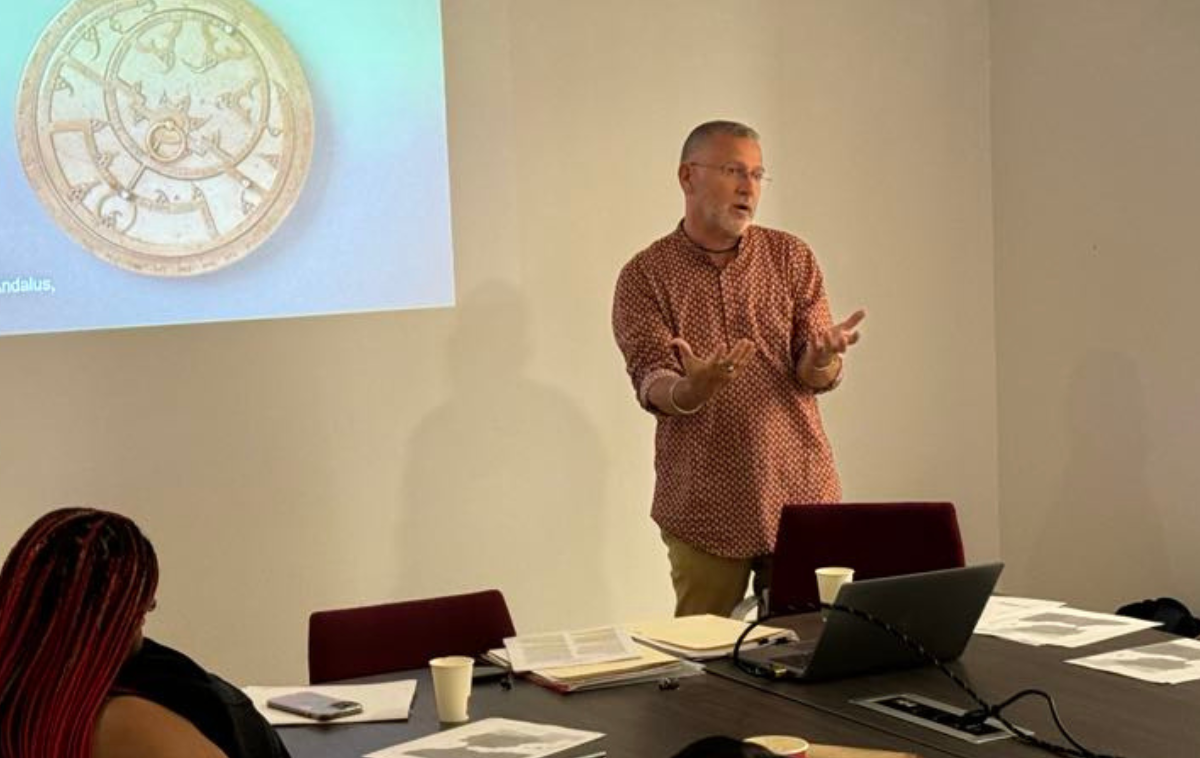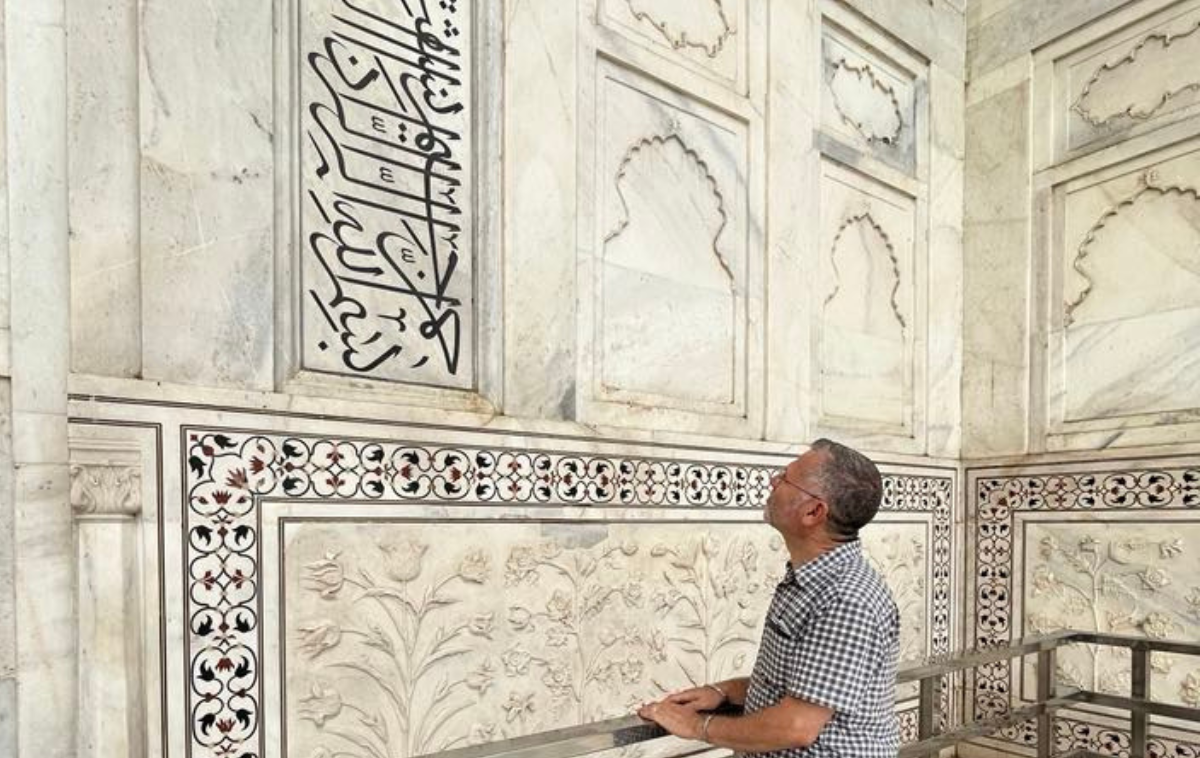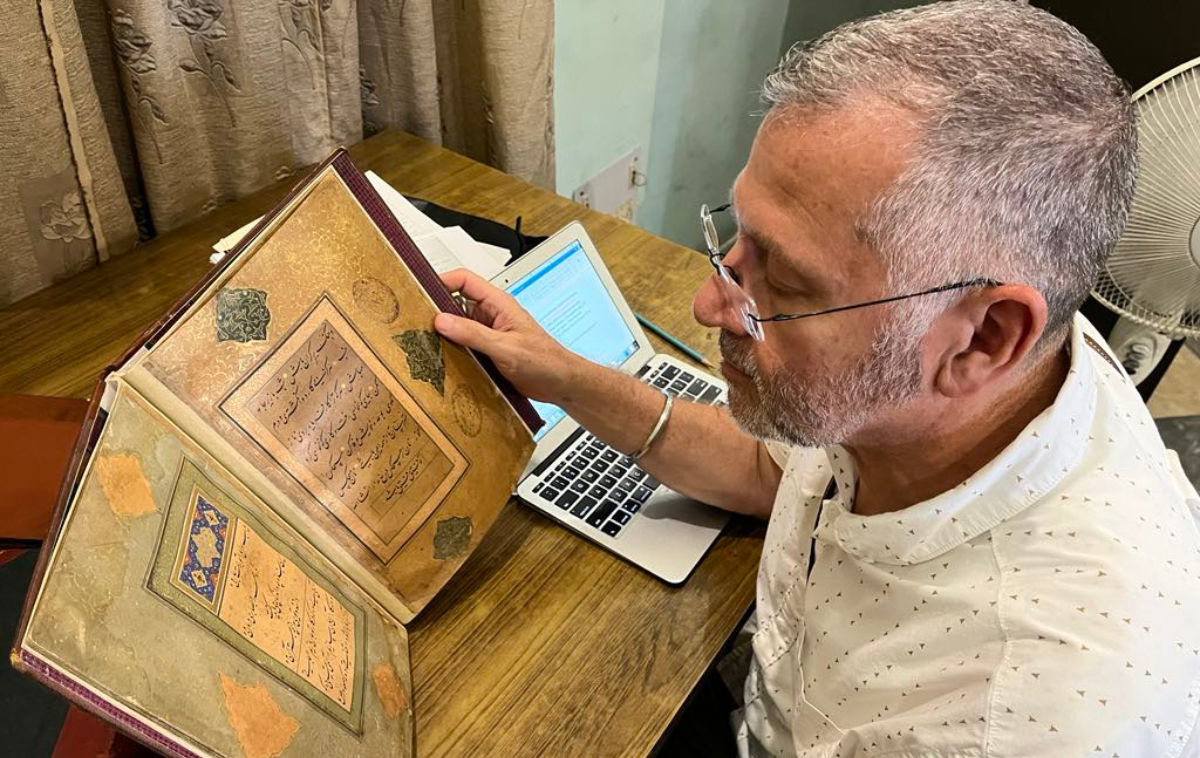Bridging faiths: St. Bonaventure’s Center for Arabic and Islamic Studies
Date Published: October 08, 2024
By Eli Pacheco
How do Catholics perceive Islam? How do Muslims understand Catholicism?
Since 2015, the Center for Arabic and Islamic Studies at St. Bonaventure University has provided fertile ground for appreciating and examining the similarities and differences between the two religions.
Br. Michael Calabria, OFM, serves as founder and director of the center at the Allegany, New York, school. He brings a wealth of knowledge and experience in interreligious dialogue, especially between Muslims and Christians, to the classroom.
“One in four people in the world is Muslim,” Br. Michael said. “It’s vital that all people, regardless of faith, have some understanding of Islam to be a positive contributor to contemporary society, no matter where you live.”

Br. Michael Calabria teaches St. Bonaventure students about Islamic Spain in Madrid in July 2024. (Photo courtesy of Br. Michael)
Why a Center for Arabic and Islamic Studies?
Like a Koran among hymnals in a Catholic church’s pews, the Center for Arabic and Islamic Studies stands out at the Catholic St. Bonaventure University. Br. Michael attributes the center's presence to what a Catholic-Franciscan education means today.
“Our community includes people of many different faiths,” he said. “Catholic-Franciscan education is about educating people for the world. It’s about the search for knowledge and understanding of the world, one another, and us.
“Once you experience another person of faith in their faith, you must, if you're open, think God is with them as much as God is with you.”
The center’s mission to promote an understanding of Arab and Islamic cultures comes at an important time in history. Islamophobia is on the rise in the United States, with The Council on American-Islamic Relations recording a 56 percent increase in anti-Muslim incidents from 2022 to 2023, the highest number of recorded incidences in its 30-year history.
The Franciscans have long played a role in fostering Christian-Muslim relations, beginning with St. Francis’s encounter with Sultan al-Malik al-Kamil in 1219 during the Fifth Crusade. In contrast to the prevailing Christian attitudes of defaming Islam, St. Francis engaged the Sultan peacefully and respectfully. Although their encounter did not end the crusade, it continues to serve as an important example for Christian-Muslim dialogue.
More than 800 years later, the Order of Friars Minor continues to foster peaceful, mutually respectful relationships between Christian and Muslims. Br. Michael served as the global Order of Friars Minor’s special assistant for dialogue with Islam from 2016 to 2021 and took part in the worldwide celebrations commemorating the 800th anniversary of St. Francis’s visit with the Sultan in 2019.
Following in the footsteps of the saint whose name he bears, Pope Francis has worked to improve relations between Christians and Muslims through visits to mosques and meetings with Muslim leaders. In 2019, he and Ahmad Al-Tayyeb, Grand Imam of Al-Azhar, signed the “Document on Human Fraternity for World Peace and Living Together,” which invites all people of faith to "advance a culture of mutual respect in the awareness of the great divine grace that makes all human beings brothers and sisters.”

Br. Michael Calabria studies the Qur’anic inscriptions at the Taj Mahal in Agra, India, in July 2023. Michael is the author of “The Language of the Taj Mahal: Islam, Prayer & the Religion of Shah Jahan” (2022). (Photo courtesy of Br. Michael)
A growing interest in Arabic and Islamic studies
In the same spirit, the Center for Arabic and Islamic Studies teaches the next generation to revere experiences with different faith traditions. Br. Michael emphasizes to students that reverence is more than mere respect or tolerance – it connotes a divine encounter.
“If we revere our encounters with our non-Catholic, non-Christian brothers and sisters, we recognize that there is a divine presence there,” he said.
Students’ curiosity about Islamic history and culture was the catalyst for the center’s creation.
Two decades ago, as Br. Michael was teaching courses on the Hebrew Bible, the New Testament and the Koran, he used Arabic words that have no English translation.
“You use the Arabic word (in those classes),” Br. Michael said. “As a result of those classes, students asked about studying Arabic.”
In 2004, Br. Michael offered St. Bonaventure’s first Arabic classes. “That took off,” he said, “and students again started asking for courses on Islam.”
Br. Michael created courses on Christian-Muslim relations, the history of the modern Middle East, women in the ancient and modern Middle East, Islamic art and architecture, and more. The university began offering an Arabic and Islamic Studies minor in 2007. “It just grew because people wanted more,” he said.
As the program expanded, Br. Michael – who already had a master's in theology from Washington Theological Union, a master's in legal studies in Library Science from Columbia University, and a Master's in Egyptology from Brown University – left Bonaventure in 2012 to earn a doctorate in Islamic Studies from the University of Exeter, England, while living at Georgetown University in Washington, D.C.
“I returned to Bonaventure in 2015 with my PhD in hand, and we inaugurated the Center for Arab and Islamic Studies,” Br. Michael said. “And the rest, as they say, is history.”

Br. Michael Calabria studies a medieval Persian manuscript in the Rampur Raza Library in India. He has also conducted research in Jordan, Morocco, Oman and several other nations. (Photo courtesy of Br. Michael)
Community, scholarship and outreach
Today the Center for Arabic and Islamic Studies offers on-campus and off-campus instruction, community outreach and engagement opportunities, and scholarship contributing to the study of Christian-Muslim relations.
Pass by a classroom door at the center, and you might overhear a student reading the Koran in Arabic. “It’s just magical,” Br. Michael said.
The Muslim Student Association fosters community and creates space for constructive dialogue and education on Islamophobia and other injustices. It welcomes students of all faith traditions for learning, fellowship and special events.
“I hope that more students will come to St. Bonaventure to study Arabic and Islamic Studies within a distinctly Franciscan environment of reverence,” Br. Michael said. “They will help create a greater appreciation of Arab and Islamic societies, both their historical and contemporary significance in the global community, and foster respectful relations between Muslim and Christian people.”

.png?sfvrsn=a0431fdc_1)